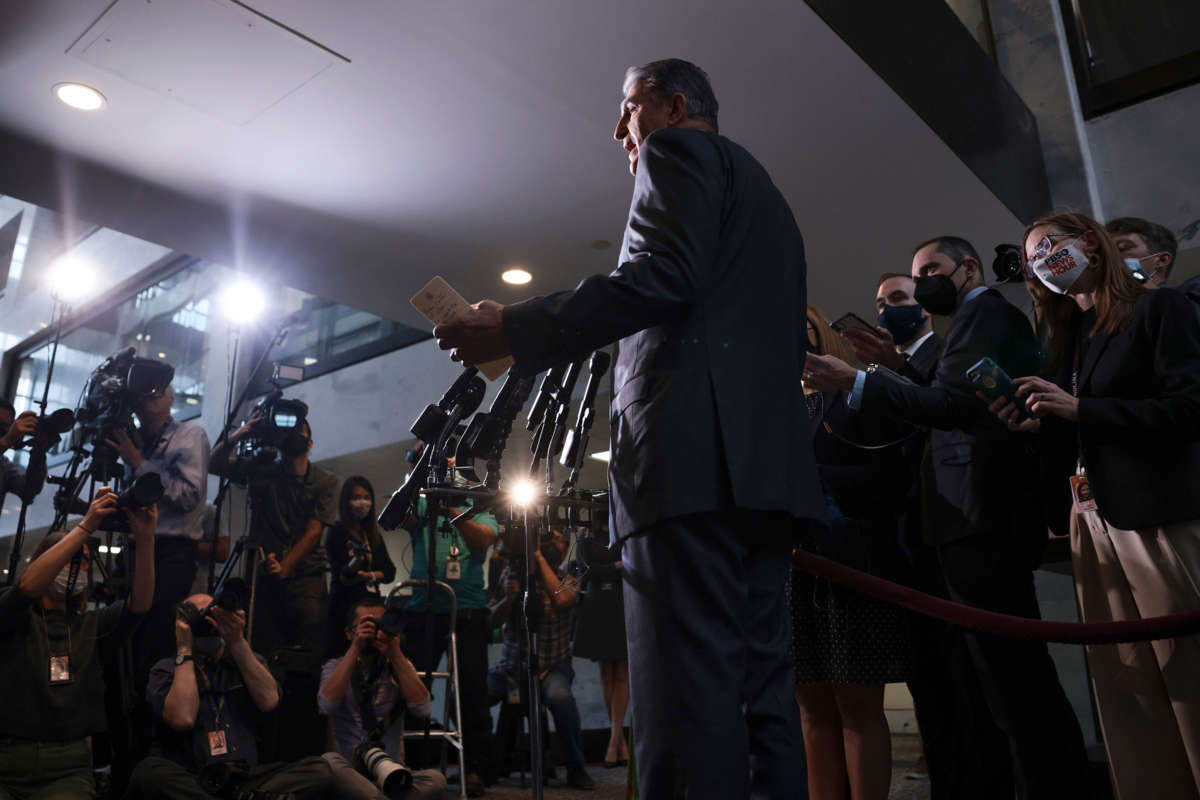West Virginia conservative Democrat Sen. Joe Manchin is obstructing a key climate proposal in the Build Back Better Act, sparking outrage among progressives and climate advocates who say that this is the Democrats’ last chance to meet emissions targets set by international agreements and President Joe Biden. Meanwhile, Manchin’s cousin-in-law has said that the senator’s opposition to climate progress will affect his own family.
According to the New York Times, it’s likely that the clean electricity program known as the Clean Energy Performance Program, or CEPP, will be cut from the bill due to Manchin’s opposition. Manchin chairs the Senate Energy and Natural Resources Committee and is in charge of crafting the climate portion of the bill.
Manchin has been hinting at wanting to water down the CEPP during negotiations, but killing it outright is a new position from the senator, one that lines up with his status as a coal baron and with the campaign his fossil fuel lobbyist friends have waged against climate action.
The CEPP would drive down emissions over the next decades by rewarding utilities for using clean energy sources like wind and solar and punishing utilities that don’t meet certain benchmarks. It would lead to an emissions reduction of about 82 percent of 2005 levels by the end of the decade, on track with Biden’s emissions reduction goals. It would also be the nation’s first federal policy aimed specifically at reducing greenhouse emissions.
Because the CEPP falls under reconciliation, which requires only a simple majority to pass the Senate, it is likely the Democrats’ only chance at passing meaningful climate legislation before the 2022 midterm elections — when early projections say that Democrats could lose control of Congress.
As the New York Times reported on Sunday, Manchin’s obstruction could directly affect his own family. Manchin’s hometown of Farmington has been affected by overwhelming rains and flooding over the past years. The storms are likely worsening due to the climate crisis, which can create more precipitation in places like Farmington, a small town surrounded by a creek on three sides.
“These last few years here in West Virginia, we’ve had unbelievable amounts of rain,” Jim Hall, who is married to Manchin’s cousin, told the New York Times. “We’ve seriously considered not staying.” Hall recalled a 2017 flood when he and his wife had to be rescued from inside their home. He also spoke about having to help his neighbors — Manchin’s sister and brother-in-law — clear out their basement to prepare for storms.
That Manchin’s radical and climate-denying obstruction could harm his own family is ironic considering he often cites workers in his home state as a reason to oppose climate legislation. But coal actually plays a relatively small role in his state’s economy, and it’s unlikely that he actually cares about coal workers, since he has rejected a plan to subsidize coal workers’ incomes while they shift away from the dying industry.
The climate crisis will also affect other residents in West Virginia, many of whom don’t have the resources to move when climate disasters hit their neighborhoods. While West Virginia officials are struggling to protect residents from the worsening effects of the climate crisis, Manchin is collecting lobbyist funds.
Progressive lawmakers have expressed frustration over Manchin’s obstruction of the CEPP. “We cannot advance legislation that makes the climate crisis worse,” said Rep. Alexandria Ocasio-Cortez (D-New York) on Twitter. “The Exxon-designed ‘bipartisan’ infrastructure plan worsens emissions, but pairing it w/clean energy in Build Back Better neutralizes BIF’s harm and lets us tackle the climate crisis. We cannot afford to gut it.”
Rep. Rashida Tlaib (D-Michigan) also spoke out against Manchin and conservative Democrats, saying, “The most frustrating challenge in Congress right now is the fact that some would rather do nothing.”
Join us in defending the truth before it’s too late
The future of independent journalism is uncertain, and the consequences of losing it are too grave to ignore. To ensure Truthout remains safe, strong, and free, we need to raise $50,000 in the next 10 days. Every dollar raised goes directly toward the costs of producing news you can trust.
Please give what you can — because by supporting us with a tax-deductible donation, you’re not just preserving a source of news, you’re helping to safeguard what’s left of our democracy.
